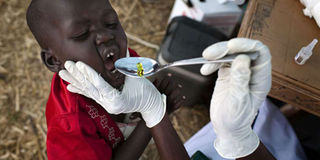Breaking News: At least 10 feared to have drowned in Makueni river
Study reveals vitamin A ‘lowers mother-to-child HIV infection’

A South Sudanese child receives a dose of vitamin A given by Medecins Sans Frontieres (MSF, doctors without borders) in an isolated makeshift IDP camp for Dinka ethnic group on March 5, 2014. PHOTO | JM LOPEZ | AFP
What you need to know:
- World Health Organisation findings state that more than 1,000 new cases of mother-to-child transmission of HIV occur worldwide every day.
- Studies in sub-Saharan Africa have shown low serum vitamin A levels in HIV-positive women to be associated with increased rates of mother-to-child transmission of HIV and infant mortality.
Transmission of human immunodeficiency virus (HIV) from mother to child could be reduced if expectant women take Vitamin A during pregnancy and after delivery.
A new study shows the supplements are especially useful in remote areas as they are affordable and strategies such as exclusive breastfeeding from birth to six weeks and elective Caesarean section delivery cannot be implemented.
Researchers from South African Medical Research Council said the Vitamin A intervention has largely been superseded by anti-retroviral therapy (ART) yet it is widely available and effective in preventing vertical transmission.
The study was done to evaluate the effects of giving vitamin A supplements to HIV-positive women during pregnancy and after delivery.
The researchers compared women receiving vitamin A to those not receiving such nutritional support. None of the participants received ART.
INFECTION
Professor Charles Wiysonge, the lead researcher and director of the South African Cochrane Centre at the South African Medical Research Council, said in some low- and middle-income countries with high rates of infection, conventional interventions such as exclusive breastfeeding, ART and admission of naveripine (a form of infant ART) may not be practical or affordable.
“Simple, inexpensive and effective interventions that could potentially be implemented even in the absence of prenatal HIV testing programmes would be valuable,” said Prof Wiysonge. “Vitamin A, which plays a role in immune function, is one low-cost intervention that has been suggested in such settings.”
He said other observational studies in sub-Saharan Africa have shown low serum vitamin A levels in HIV-positive women to be associated with significantly increased rates of mother-to-child transmission of HIV and infant mortality.
METERNAL RISK
“Vitamin A was assumed to decrease mother-to-child transmission of HIV by acting through several maternal, foetal, child risk factors for transmission, or all three,” said Prof Wiysonge.
The study was supported by World Health Organisation (WHO) findings, which state that more than 1,000 new cases of mother-to-child transmission of HIV occur worldwide every day, making it the main route of transmission of infection in children.
The global health agency revealed that Vitamin A deficiency also affects about 19 million pregnant women, mostly from the WHO regions of Africa, and has been associated with an increase in the risk of transmission of HIV from mother to child.




